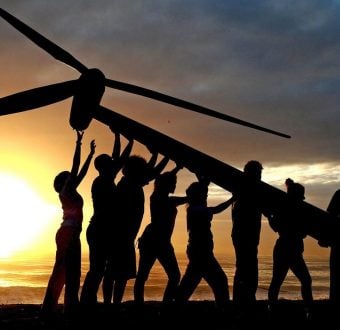Earlier this month, the people of Oregon celebrated a major victory. Oregons Department of State Lands (DSL) denied a key permit for Ambre Energys Morrow Pacific project. This project would have exported more than 8 million tons of coal annually through the Columbia River region to be sold overseas in Asia.
Ambre Energy has until Sept 8th to challenge the DSL decision with an appeal.
With five days until the appeal deadline, we compiled 5 reasons why Ambre should just pack up and go home.
5. The People Will Not Back Down
A massive coalition of people, doctors, business owners, farmers, children, elected officials, unions, and many many more have made it perfectly clear that they do not want coal export terminals in their community. In fact, the people of Washington and Oregon overwhelmed state agencies with the number of public comments they filed against these proposed export facilities. Do you really think they would call it quits and head home now? Yeah, I dont think so,
4. The project violates Tribal treaty rights and threatens traditional fishing grounds on the Columbia River.
Earlier this year, Ambre Energy offered the Confederated Tribes of the Umatilla Indian Reservation $800,000 a year to support the Morrow Pacific Project. They said no. Umatilla, along with the Yakama Nation and other regional tribes, have been among the most outspoken opponents to the coal export terminal. The proposed project violates treaty rights and threaten traditional fishing grounds, salmon runs, and the health of people.
3. Ambre, no one really wants your coal anyway.
A growing number of news articles and reports released in the last year have called into question the true global demand for US Powder River Basin coal. Even if companies are able to build an export facility, would anyone even want the coal? With Chinas coal use on decline and inferior US coal losing out to Indonesia and Australia on the global market, Ambres ability to find a long-term buyer seems grim at best.
2. You dont exactly have the best track-record of playing nice with others.
Ambre is in the midst of a lengthy legal battle with its former partner and rival coal company, Cloud Peak Energy. In 2012, Ambre agreed to take control of the Decker coal mine in Montana for $64 million. Cloud Peak was eager to close up operations by the end of 2013 but Ambre has pushed to keep the mine open to feed its proposed export terminals in Oregon and Washington, causing Cloud Peak to file a lawsuit over Ambres mismanagement of the mine and their contract. With slowing production at the mine and setback after setback, Ambre had to lay off 75 workers and has yet to settle up with Cloud Peak. Cloud Peak even went on record expressing their serious concerns about the financial viability of Ambre and the Morrow Pacific Projects. Yikes. When even your fellow coal companies dont trust you, youre in trouble.
1. Lets face it Ambre, youre broke.
As Wall Street turns away from investments in risky coal export terminals, Ambres hopes of securing the funding necessary to complete these projects gets tougher and tougher.



